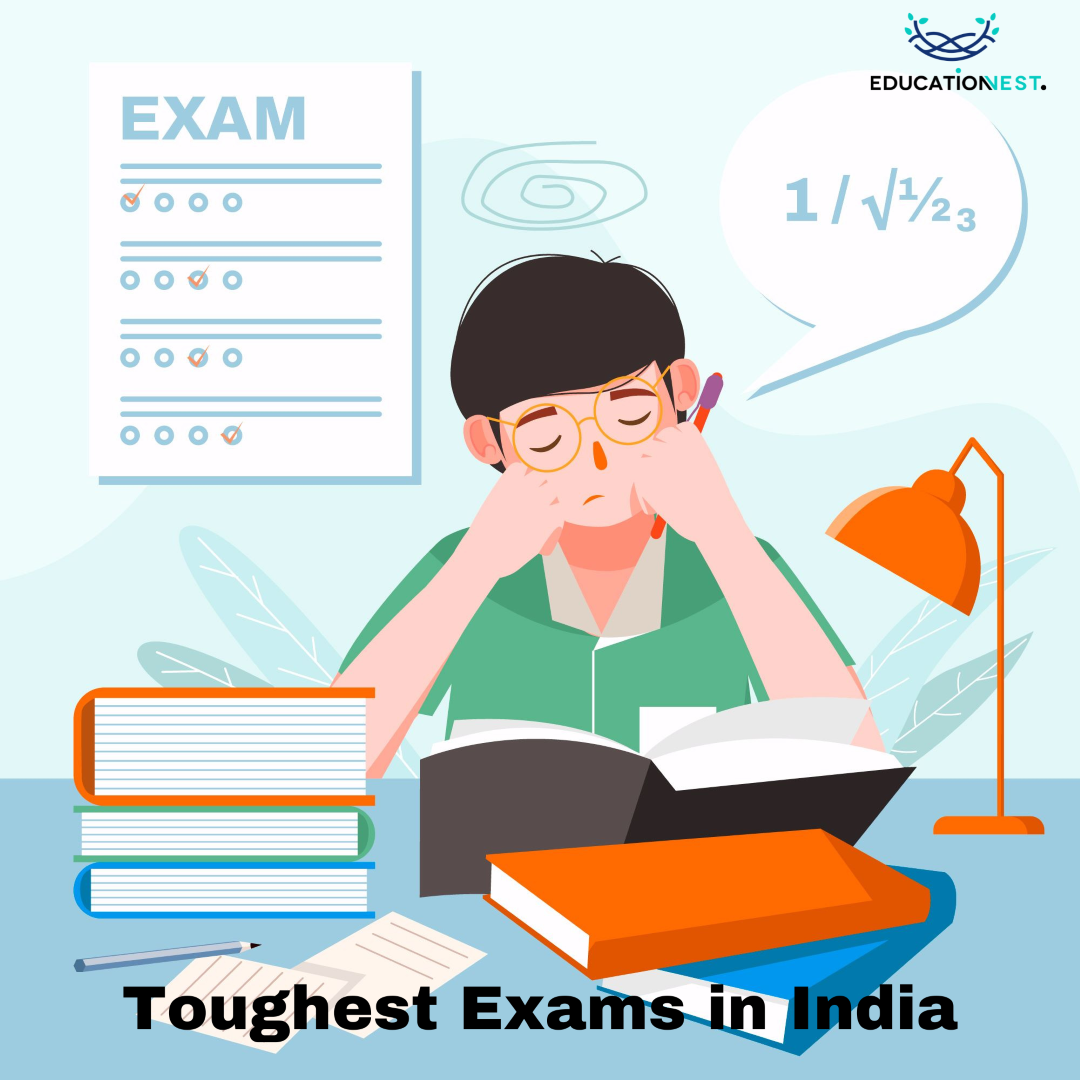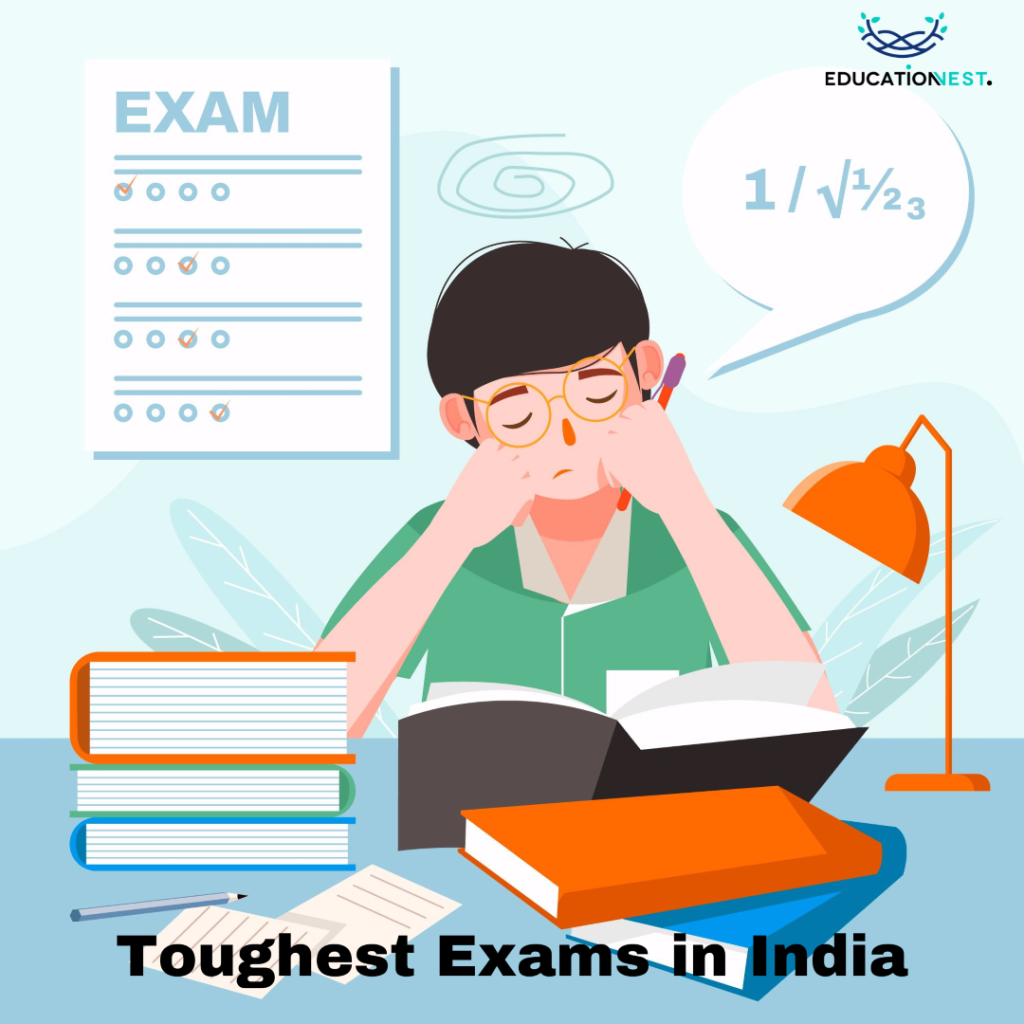
India is a nation where education is revered, and its competitive exams are as challenging as they come. Often, these exams are compared to some of the toughest exams in the world. In this blog, we will delve into the top 7 toughest exams in India, which are not only difficult in terms of content but also hold a significant place in shaping the future of countless aspirants. Many of these exams are renowned globally and are often considered the toughest course in the world. India sets a global benchmark with some of the toughest exams in India, recognized not just nationally but also esteemed as some of the toughest exams in the world. As we explore each one, we’ll understand why they are deemed the toughest exam in the world in their respective fields. The phrase ‘toughest exam in the world‘ resonates deeply with Indian students, as these examinations demand an exceptional level of dedication and intellectual prowess. The preparation for these exams is more than just academic pursuit; it’s a journey that molds aspirants into persistent and disciplined individuals.
List of Toughest Exams in India
Here is a comprehensive list of the toughest exams in India:
- Union Public Service Commission (UPSC) Exams
- Joint Entrance Examination (JEE) Advanced
- National Eligibility cum Entrance Test (NEET)
- Chartered Accountancy (CA) Exams
- Graduate Aptitude Test in Engineering (GATE)
- Common Law Admission Test (CLAT)
- Indian Institute of Science Education and Research (IISER) Aptitude Test
- Common Admission Test (CAT)
- All India Institute of Medical Sciences (AIIMS) MBBS Entrance Exam
- National Institute of Design Entrance Exam
- National Defence Academy (NDA) and Naval Academy (NA) Examination
- Indian Statistical Institute Admission Test
- Joint Entrance Screening Test (JEST)
- UGC National Eligibility Test (NET)
- Indian Council of Agricultural Research (ICAR) AIEEA
- Indian Forest Service Examination (IFoS)
- Staff Selection Commission Combined Graduate Level Exam (SSC CGL)
- Reserve Bank of India (RBI) Grade B Exam
- Indian Engineering Services (IES) Exam
- Jawaharlal Nehru University Entrance Exam (JNUEE)
List of Toughest Exams in the World
Here is a list of some of the toughest exams in the world:
- Gaokao (National College Entrance Examination, China)
- IIT JEE (Indian Institutes of Technology Joint Entrance Examination, India)
- UPSC Civil Services Exam (Union Public Service Commission, India)
- Mensa IQ Test (Mensa International)
- CFA Exam (Chartered Financial Analyst, USA)
- CCIE (Cisco Certified Internetwork Expert, USA)
- All Souls Prize Fellowship Exam (University of Oxford, UK)
- Master Sommelier Diploma Exam (Court of Master Sommeliers, Global)
- GRE (Graduate Record Examinations, USA)
- California Bar Exam (USA)
- LNAT (Law National Aptitude Test, UK)
- USMLE (United States Medical Licensing Examination, USA)
- CPA Exam (Certified Public Accountant, USA)
- Chartered Accountancy Exam (Various countries, including the UK and India)
- PMP (Project Management Professional, Global)
- GATE (Graduate Aptitude Test in Engineering, India)
- STEP (Sixth Term Examination Paper, University of Cambridge, UK)
- BMAT (Biomedical Admissions Test, UK)
- Actuarial Science Exams (Various countries)
- Patent Bar Exam (USA)
Also Read:
Top 10 Toughest Course in India you need to know about
Let’s explore 7 toughest exams in India in detail..
Union Public Service Commission (UPSC) Exams
The Union Public Service Commission (UPSC) Exams, especially the Civil Services Exam, stand as a pinnacle of challenge and prestige in India. Often considered among the toughest exams in India, the UPSC exams test a wide array of subjects, from history and geography to economics and current affairs. What makes this exam particularly challenging is not just the breadth of the syllabus, but also its depth. Aspirants are required to have an in-depth understanding of each topic, coupled with the ability to analyze and present information in a coherent manner.
The exam is conducted in three phases: the Preliminary exam, the Main exam, and the Interview or Personality Test. Each stage is a significant hurdle in itself. The Prelims, a multiple-choice test, is often tricky with its vast coverage of subjects. The Mains, comprising written examinations, demands not just knowledge but also the skill to express one’s thoughts clearly and concisely. Lastly, the Interview assesses a candidate’s personality, presence of mind, and ability to handle pressure.
Preparation for the UPSC exams is a journey that takes months, if not years, of dedicated study. It’s not uncommon for candidates to attempt this exam multiple times, learning and evolving with each attempt. The rigor and complexity of the UPSC exams indeed make them a symbol of excellence and dedication in the Indian educational landscape.

Joint Entrance Examination (JEE) Advanced
The Joint Entrance Examination (JEE) Advanced is a critical stepping stone for students aspiring to join India’s prestigious Indian Institutes of Technology (IITs). Renowned as one of the toughest exams in India, especially in the field of engineering, it represents a significant challenge. The exam tests students on their knowledge and understanding of three main subjects: Physics, Chemistry, and Mathematics. Each of these subjects presents intricate problems that require deep conceptual understanding and the ability to apply concepts in complex situations.
What makes JEE Advanced exceptionally challenging is not just the level of difficulty of the questions but also the intense competition. Every year, lakhs of students compete for a very limited number of seats in the IITs. This high level of competition demands not only academic proficiency but also strategic preparation and mental resilience. The JEE Advanced, therefore, is not just a test of knowledge, but a test of a student’s ability to perform under pressure, making it a formidable exam in the Indian education system.
National Eligibility cum Entrance Test (NEET)
The National Eligibility cum Entrance Test (NEET) is the gateway for students aspiring to enter the medical field in India. Widely regarded as one of the toughest exams in India, NEET is the sole entrance test for admission into medical and dental colleges across the country. This exam tests the candidates on three primary subjects: Biology, Chemistry, and Physics. The level of questions in NEET is highly challenging, requiring a deep understanding of each subject and the ability to apply this knowledge practically.
The competition in NEET is fierce, with lakhs of students vying for a limited number of seats in prestigious medical colleges. This intense competition makes NEET not just an academic challenge, but also a test of a student’s dedication, time management, and perseverance. The preparation for NEET demands consistent effort, often over years, and a focused approach to mastering a wide range of topics. This exam is a crucial step for those dreaming of a career in medicine and stands as a significant hurdle in the journey of aspiring medical professionals.
Chartered Accountancy (CA) Exams
The Chartered Accountancy (CA) Exams, conducted by the Institute of Chartered Accountants of India (ICAI), are renowned for their rigorous standards, making them one of the toughest exams in India. These exams test a candidate’s proficiency in a wide range of subjects related to accountancy, taxation, business laws, and auditing. The CA exams are divided into three levels: the CA Foundation, the CA Intermediate, and the CA Final, each progressively more challenging.
The journey to becoming a Chartered Accountant is demanding, requiring not just a grasp of complex financial concepts but also an ability to apply this knowledge in practical scenarios. The syllabus is extensive, and the exams are known for their low pass rates, which adds to the pressure. Aspiring CAs often dedicate years to passing these exams, reflecting their commitment and endurance. The CA qualification is highly respected in the fields of finance and business, symbolizing a high level of expertise and ethical standards.
Graduate Aptitude Test in Engineering (GATE)
The Graduate Aptitude Test in Engineering (GATE) is a pivotal examination for engineering graduates in India, widely recognized for its challenging nature. It serves as a gateway for postgraduate education in engineering at prestigious institutes and also provides opportunities in various public sector enterprises. GATE assesses the understanding and knowledge of candidates in various engineering and science subjects.
What makes GATE particularly challenging is its focus on the application of concepts and problem-solving abilities, rather than just rote learning. The exam is designed to test a student’s fundamental understanding of their respective engineering field, requiring a deep and comprehensive grasp of technical subjects. The questions are often conceptual and analytical, requiring candidates to apply their learning in novel ways.
Moreover, the competitive nature of GATE, with thousands of students appearing each year, adds to its difficulty level. The preparation for GATE demands a strategic approach, thorough understanding, and consistent practice. The exam not only opens doors to higher education but also enhances career prospects, making it a highly sought-after and respected examination in the field of engineering.
CAT (Common Admission Test)
The Common Admission Test (CAT) is one of the most competitive and prestigious MBA entrance exams in India, conducted for admission into top management institutes including the IIMs (Indian Institutes of Management). CAT is known for its high difficulty level and is a significant hurdle for those aspiring to pursue a career in business and management.
CAT primarily tests a candidate’s abilities in three major areas: Quantitative Ability (QA), Verbal Ability and Reading Comprehension (VARC), and Data Interpretation and Logical Reasoning (DILR). The exam challenges candidates with its complex quantitative problems, intricate data interpretation sets, and extensive reading passages that require a deep understanding of the English language. This variety in the question types ensures a comprehensive assessment of a candidate’s aptitude and analytical skills.
The preparation for CAT demands not only a strong academic foundation but also strategic planning, time management, and the ability to perform under pressure. The competition is intense, with thousands of aspirants vying for a limited number of seats in elite institutions. CAT, therefore, is not just a test of knowledge, but an assessment of one’s ability to think critically, manage time efficiently, and make decisions under stress, making it a formidable exam in the Indian academic landscape.

